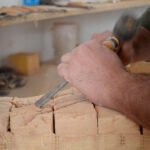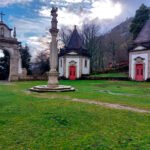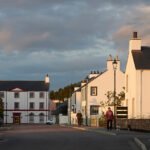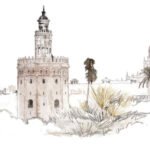Los materiales cerámicos son un elemento clave en el patrimonio cultural, en particular en los edificios históricos, desde la antigüedad al presente. La cerámica aplicada en la arquitectura implica problemas concretos cuando se trata de preservación, así como intervenciones de conservación y restauración. El conocimiento sobre el origen, la selección de materias primas adecuadas y una mejor comprensión de la tecnología utilizada para la fabricación de piezas cerámicas tiene importantes implicaciones para la conservación de estos materiales.
Este curso está coordinado y co-organizado por Youth in Conservation of Cultural Heritage Association YOCOCU-Spain, co-organizado por el Instituto de Geociencias IGEO (CSIC, UCM), la Sociedad Española de Cerámica y Vidrio (SECV) y el Instituto de Cerámica y Vidrio (ICV), financiado por ECERS, el Journal of European Ceramic Society Trust y SECV.
El principal objetivo del curso es ofrecer un programa de formación de corta duración centrado en el uso del material en el patrimonio arquitectónico, incluyendo tanto los elementos estructurales como los decorativos. Se abordarán temas como: las materias primas y las tecnologías usadas para la fabricación, la alteración o los procesos de degradación, el estudio de técnicas de caracterización y las tendencias en tratamientos de conservación.
El curso se celebrará los días 29 y 30 de junio en el Instituto de Cerámica y Vidrio (ICV-CSIC)
PROGRAMA (El curso se impartirá enteramente en inglés)
Wednesday 29th June, 2016
MORNING 09:00-13:00h
09:00-09:45 h Registration
09:45-10:00 h Presentation and Welcome
Fausto Rubio Alonso, Director of Ceramics and Glass (ICV-CSIC). Madrid.
Natalia Perez Ema, Coordinator of YOCOCU Spain Association.
TOPIC 1 (T1). Ceramic materials in building heritage: raw materials and processing
10:00-11:00 h T.1.1 Bruno Fabbri (Masterclass): Ceramic construction material in cultural heritage: typologies, manufacture and properties. Institute of Science and Technology for Ceramic Materials (ISTEC-CNR), Faenza, Italy (Retired in 2015).
11:00-11:30 h Coffe break
TOPIC 2 (T2). Decay, degradation factors and mechanisms
11:30-12:15 h T.2.1 Francisco Fernandes: Understanding the deteriration of cold clay bricks. Universidade Lusiada-Norte, Vila Nova de Famalicao, Portugal-
12:15-13:00 h T.2.2 Mathilda Larsson Coutinho: Biological colonization and biodeterioration of architectural ceramic materials. Research Unit VICARTE – Vidrio e Ceramica para as Artes (Glass and Ceramic for the Arts) and Faculty of Sciences and Technology, Universidade Nova de Lisboa (FCT NOVA).
13:00-14:00 h Lunch
AFTERNOON 14:00-17:00 h
14:00-14:45 h T.2.3 Mauro Francesco La Russa: Bricks and ceramics in underwater environment: Characterization and degradation. Calabria University (UNICAL), Italy.
TOPIC 3 (T3). Analytical techniques for characterization and conservation studies
14:45-15:30 h T.3.1 Manuel García Heras: Archaeometric characterization of historical ceramic materials: bricks, roofs and decorative tiles. Institute of History (IH-CSIC). Madrid.
15:30-16:15 h T.3.2 Mónica Álvarez de Buergo: NDT I: Non destructive techniques to measure surface properties. Geosciences Institute (IGEO-CISC, UCM) Madrid.
16:15-17:00 h T.3.3 Miguel Gómez-Heras: NDT II: Non destructive techniques to measure bulk properties. Geosciences Institute (IGEO-CSIC, UCM) Madrid.
Thursday 30th June, 2016
MORNING 09:00-14:15 h
TOPIC 4 (T4). Intervention/Treatments
09:00-09:45 h T.4.1 Barbara Lubelli: Desalination of masonry by poulticing: laboratory research and application in the field. Netherlands Organisation for Applied Scientific Research (TNO). Delft, Holland.
11:15-11:45 h Coffe Break
11:45-12:00 h Carmen Baudin: General Secretary of Spanich Society of Ceramics and Glass. Spanish Society of Ceramics and Glass as associative frame for young researchers. European Ceramic Society and Journal of the European Ceramic Society Trust.
12:00-12:45 h T.4.4 Silvestro Ruffolo: Conservation of ceramics and bricks in underwater environment: state of art and new perspectives. Calabria University, Italy.
TOPIC 5 (T5) Preventive conservation
12:45-13:30 h t.5.1 Manuel Blanco: Preventive Conservation of built Heritage. Geoartec Technical Solutions, S.L. Zaragoza, Spain.
13:30-14:30 h Lunch
AFTERNOON 14:30-18:30h
TOPIC 6 (T6) Case of study
14:30-15:15 h T.6.1 Elena
Perez-Monserrat: Documentation and characterization to determine the processing of ceramic materials: Former Hospital of Maudes (Madrid, Spain). Geosciences Institute (IGEO-CSIC, UCM) Madrid, Spain.
15:15-16:00 h T.6.2 Carmen Pascual: Ceramic characterization of porcelain flooring tiles from La Casa del Labrador in Aranjuez (Madrid, Spain). Institute of Ceramics and Glass (ICV-CSIC). Madrid, Spain.
16:15-18:30 h VISIT
Yococu Spain: espanayococu@gmail.com
IGEO: empmon@geo.ucm.es







